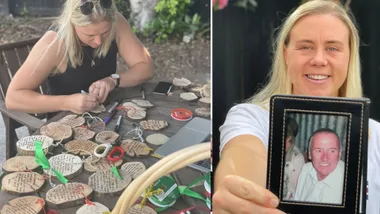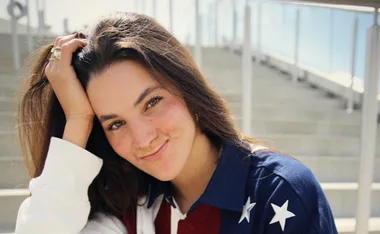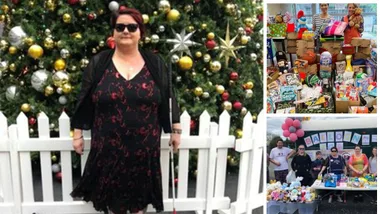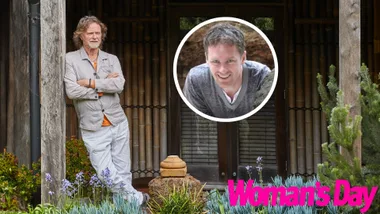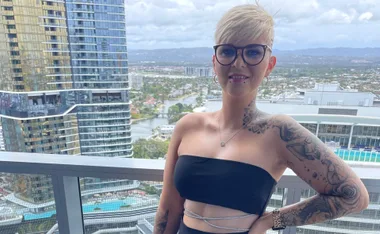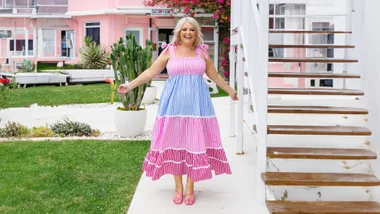Jenny, 52, shares her story…
Soon after I got home from the hospital with my newborn son Jamie, it became clear he wasn’t like other babies.
He never stopped wriggling and hated to sleep.
“He’ll settle down soon,” my sister Charlotte, 40, told me.
She had three kids and knew every trick in the book for getting babies into a good routine.
But none of her advice worked on Jamie.
As he got a bit older, he began to do other odd things. He’d make bizarre faces when he was angry and he screamed his head off when he was around other kids.
My husband, Chris, thought I was overreacting but I knew deep down there was something wrong with Jamie.
When he was 15 months old I took him to the child health nurse and asked for advice.
“He’s just going through a phase,” she told me.
Why wouldn’t anyone listen to me?
Jamie’s behaviour got worse. From the moment he could talk, he would shout at me and refused to do anything I asked.
When he turned two, I decided to buy us a puppy.
I thought having a pet to take care of might calm Jamie down and give him something positive to focus on.
At first, he seemed to take to the tiny chocolate-coloured Labrador, who he named Mars.
But one day we were in the kitchen, when Jamie suddenly grabbed a knife and lunged forward and stabbed him. Mars let out a huge yelp and ran to hide in a corner.
“Jamie, how could you do that?” I cried.
Jamie just shrugged. What sort of child would hurt an innocent animal?
I gave Mars away to a friend after that, terrified of what Jamie might do to him next.

“Jamie wasn’t like other babies”
photo credit: Alamy / Shutterstock
“Jamie, how could you do that?” I cried.
Jamie just shrugged. What sort of child would hurt an innocent animal?
I gave Mars away to a friend after that, terrified of what Jamie might do to him next.
By then I was desperate.
Online I found a number for child mental health services, and made an appointment for Jamie to see a therapist.
“Your son is suffering from anxiety,” she told me. “He’ll probably grow out of his behavioural problems.”
It felt like such a cop out, and I had my doubts anything was going to change.
In fact, things got even worse.
As he got older Jamie became even more controlling and aggressive.
He did whatever he wanted and bossed me around constantly.
I tried to discipline him by stopping him from playing his computer games, but he kicked and screamed until I just gave up and returned them to him.
I was utterly miserable and kept wondering, am I just a bad parent?
It wasn’t long before Jamie turned his violence on me.
One day, during one of his episodes, he lashed out and scratched me all down the arm.
“Look what you’ve done!” I cried, holding out my scraped up arm.
But Jamie just looked at me blankly like he didn’t understand.
“I love you,” I said gently. “But I don’t like your behaviour.”

Jamie turned on me.
photo credit: Alamy / Shutterstock
For a while, he was quiet and I thought I’d got through to him, but it wasn’t long before his rages returned.
They became worse than ever.
Jamie kicked, punched and threw things at me.
One day, he even hit me across the back with a cricket bat.
Every day was a struggle and I didn’t know how much longer I could cope.
I couldn’t do normal things with him like take him to the park, because I was scared he might hurt another kids.
I even hid all the sharp objects in the house.
Sometimes Jamie would ask for a cuddle and for a few moments, I would hold him in my arms and feel like any other mum.
But those moments were few and far between.
When it was time for Jamie to start preschool, I was seriously worried.
I just wasn’t sure it was a good idea for him to be around other children.
I was right to be worried.
From day one, he lashed out at all the other kids and there were numerous complaints from parents about his behaviour.
The final straw came when Jamie lunged at another pupil with a pair of scissors.
Every single parent at the preschool signed a petition to have Jamie removed from the school.
I couldn’t even argue with it.
That night, I sat Jamie down for a chat.
“I’m going to have to find you another school,” I told him.
“Everyone hates me,” Jamie said.
My heart broke.
“What matters is that I love you,” I said.
That night was one of the rare times that Jamie wanted cuddles.
I climbed into bed beside him and wrapped my arms around him.
“Mummy, maybe you can give me a magic potion that will kill me?” he said.
I couldn’t believe what I was hearing. I felt sick.

“Jaime lunged at another pupil with a pair of scissors”
photo credit: Alamy / Shutterstock
“What do you want that for, darling?” I asked.
“Because I hate life,” he said. “I’ve had enough.”
I was in shock.
He was just a toddler – how had these thoughts got into his head?
Over the next few months, Jamie asked me repeatedly to kill him.
“It’s your fault I’m alive,” he sulked.
I knew Jamie needed proper help but no doctors were willing to give it to him.
Most simply said he was badly behaved and he’d grow out of it with some strict discipline.
One diagnosed him with autism but I knew it was more serious than that.
By the time Jamie turned six, his behaviour was worse than ever.
One night at the dinner table, he started throwing spaghetti at me and up all the walls.
“Stop it, Jamie!” I warned.
When he refused, I got up from my seat and went over to take the plate away from him.
As I reached out, he grabbed his knife and stabbed it full force into my hand.
0I screamed in agony as blood dripped all over the tablecloth.
I knew I had to act this time.
I called the police, who were helpful, but they said my only option was a protection order, which would have Jamie taken into foster care.
Of course, I didn’t want that.
I loved my son and wanted to help him myself.

photo credit:Alamy / Shutterstock
But things went from bad to worse when Jamie was expelled from his new school for breaking his teacher’s finger.
“He also threatened to bring a knife in and stab other pupils,” the principal told me.
1I was beyond horrified.
After that, Jamie’s application to attend a specialist boarding school was rejected.
Now, I’m at my wits’ end.
Authorities aren’t helping me and I don’t know what to do.
I worry every day that Jamie will seriously harm others, me or himself.
The only progress we’ve made is a doctor’s diagnosis – pathological demand avoidance, which is a type of autism.
I hope that a therapist will be able to work with both of us to make things better.
Despite everything, I love my son and I am willing to do anything to help him.
2
photo credit: Alamy / Shutterstock


